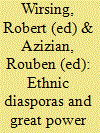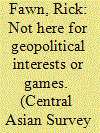| Srl | Item |
| 1 |
ID:
079279


|
|
|
|
|
| Publication |
Honolulu, India Research Press, 2007.
|
| Description |
xiii, 355p.
|
| Standard Number |
9788183860321
|
|
|
|
|
|
|
|
|
|
|
|
Copies: C:1/I:0,R:0,Q:0
Circulation
| Accession# | Call# | Current Location | Status | Policy | Location |
| 052679 | 355.03/WIR 052679 | Main | On Shelf | General | |
|
|
|
|
| 2 |
ID:
138213


|
|
|
|
|
| Summary/Abstract |
Until quite recently it was customary for expert and political circles in Central Asia to claim that Russia had no coherent strategy towards countries of the region. This statement revealed an additional undertone after the European Union had adopted a Central Asia strategy in 2007: "Even the EU has a strategy for Central Asia, but Russia..." The phrase was completed in various ways, but the bottom line remained unchanged, underscoring Russia's lack of a long-term political and economic plan for the region.
|
|
|
|
|
|
|
|
|
|
|
|
|
|
|
|
| 3 |
ID:
190175


|
|
|
|
|
| Summary/Abstract |
The European Union’s (EU) 2019 New Strategy for Central Asia and joint meetings with Central Asia’s five foreign ministers established standards and expectations for mutual relations. Throughout those initiatives and proclamations, the EU stresses its un-geopolitical essence and behaviour, including the statement that affords the article’s title. The article identifies five issue areas that demonstrate that, despite declarations otherwise, the EU reasons and acts geopolitically in this contested region: (1) the promotion of Central Asian regionalism; (2) the inclusion of Central Asia in formations beneficial to the EU; (3) selectively in economic and functionalist cooperation; (4) democracy, human rights and civil society promotion; and (5) international education cooperation. The EU identifies its comparative advantage through cost–benefit analyses and seeks to enhance its attractiveness by offering its allies to Central Asia, while excluding other, present actors. That the EU is often outmanoeuvred does not diminish this subtle yet discernible geopolitical conduct.
|
|
|
|
|
|
|
|
|
|
|
|
|
|
|
|